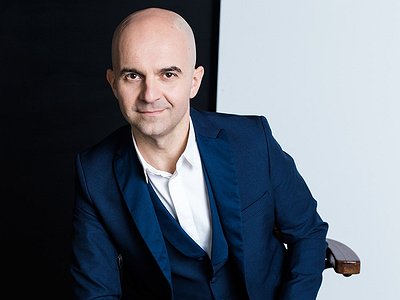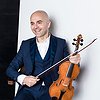Part 2
How do you make use of technology? In terms of the feedback mechanism between technology and creativity, what do humans excel at, what do machines excel at?
Very interesting question!
Indeed, with the appearance of smartphones and applications that work as tuning machines, we can say that technology has changed the way we listen. Let's think about the fact that today the sense of intonation is now based on an “absolute eye” (i.e. constantly watching the tuner screen) rather than an absolute ear! From this point of view, I think we have further lost that magical approach to music that was typical of the past centuries and that the advent of recording had already greatly contributed to downsizing. That said, this magic reappears again every now and then, and we are here to work for it.
Collaborations can take on many forms. What role do they play in your approach and what are your preferred ways of engaging with other creatives through playing together or just talking about ideas?
I love to collaborate with strong personalities, musicians who have clear ideas, solidity and awareness of their language, whatever language it is.
Only with a frank and, perhaps, energetic dialogue can you build something credible, even if it may not be in line with the historically informed criteria that are part of most of my activity. It's not necessary to talk, on the contrary. Sometimes talking about musical ideas, at certain levels, can lead to misunderstandings.
How is preparing music, playing it live and recording it for an album connected? What do you achieve and draw from each experience personally? How do you see the relationship between improvisation and composition in this regard?
I believe that music is performed live, from heart to heart, as Beethoven wrote - and in this period of quarantine this urgency presents itself almost physically. The recording is an onerous, demanding but, alas, necessary fact in order to be able not only to reach the audience, but also to express oneself and understand oneself better. I must say that with time I have also begun to appreciate the recording sessions: they are a moment of formidable musical and expressive growth. But, what an effort!
About the relationship between improvisation and composition, the baroque precept is very clear: you shouldn’t sense the difference, you can and must improvise, but always in a clear and intelligible way. The listener, that is the musician's critical ear, must not be able to recognise a decrease written extemporaneously by a free improvisation. I find that following this rule is an excellent principle to be increasingly clear and eloquent in improvisation.
How do you see the relationship between the 'sound' aspects of music and the 'composition' and 'performance' aspects? How do you work with sound and timbre?
They are two sides of the same coin and this coin is musical eloquence. There are composers who prefer the compositional technique, like dear dad J.S. Bach, and they hold up to all imaginable transcriptions. Others, on the other hand, have a language born more from the performing dimension, and can suffer much more from an unclear, unjustified or even wrong choice of timbre, and this is to the detriment of the perceived quality of the composer himself. I'm thinking of Boccherini, who without an adequate palette of timbre in execution can be very limited and poor (which he absolutely is not!) or even G. Ph. Telemann, a composer of great culture, with vast and open-minded musical interests, who has suffered a strong penalty for insipid and humourless performances.
But it is precisely in this difficult juggling of historical, musicological and performance practise truths and a hypothetical proposal for contemporary performance that the sense of our musical work comes alive.
Our sense of hearing shares intriguing connections to other senses. From your experience, what are some of the most inspiring overlaps between different senses - and what do they tell us about the way our senses work? What happens to sound at its outermost borders?
The principle of synaesthesia is one of the intellectual processes that accompany, consciously or unconsciously, all musicians. I find it wonderful to seek and stimulate synaesthetic, transversal experiences, because it is precisely in the unspoken, in the space of meaning that is generated between two different sensory descriptions (a “grey” sound, for example, or “narrow”) where we find the space to understand the meaning of music. I like to think of a sort of “Stanislavskji method”, where, to express an “affection”, a state of mind, I “become” the expression itself.
Nothing new: this concept is at the basis of the precepts conveyed by C.P. Em Bach in his famous treatise.
Art can be a purpose in its own right, but it can also directly feed back into everyday life, take on a social and political role and lead to more engagement. Can you describe your approach to art and being an artist?
I do not feel like an artist, in the sense that I don’t believe much in the standardised image of the artist as the chosen one, with an established social function and well classified cannons of reasoning. I feel like a craftsman, as I said at the beginning of this interview, and with the craftsman I feel I share the mood, curiosity and excitement in the act of creating. Also – and I really care a lot about this - the importance of the sense of belonging to a community of musicians, first of all the musician friends of my orchestra, but also those who share my vision.
If this situation is what others describe as “being an artist”, I am relatively interested in it.
I believe that my ability to bring music to the public is a much more important “social work” than is generally thought. Those who make music, painting, dance, art, generate meaning, interpret a reality, leave a trace that knots with the lives of many people: those who make music create the will to live, and this is very important. After all, what could be more important?
It is remarkable, in a way, that we have arrived in the 21st century with the basic concept of music and performance still intact. Do you have a vision of music and performance, an idea of what they could be beyond their current form?
I love the minutes leading up to the stage: the brain spins fast and there's a sense of pleasant drunkenness.
I like to maximise the perception of this moment and I confess I feel a bit like a superhero who doesn't know his superpowers yet.
But I love even more the mood after the performance: I'm like an acrobat after the show, a tamer who escaped from the jaws of a wild beast: I did something that maybe I didn't know how to do and that, maybe, I'll never be able to do like that again, but I did it. I feel that person without an audience would never have existed. That's why I think the relationship with the stage is necessary and vital, and I can't go on for more than two weeks without playing concerts.
I think that in the future we will have to go back and rediscover the quality of small things: more contained organics, less popular but deeper programs, maybe more “difficult”, but authentic. We also need complexity and an audience that knows how to appreciate it.






